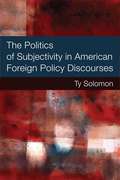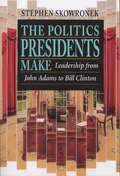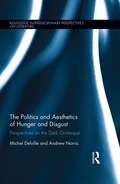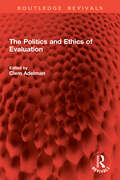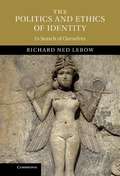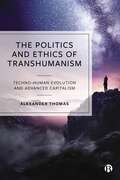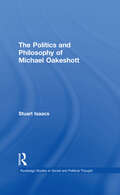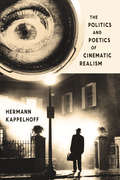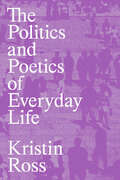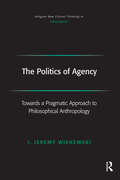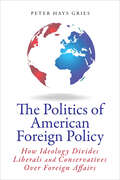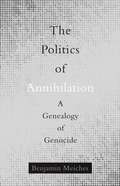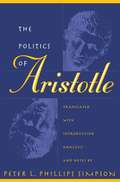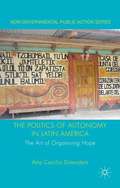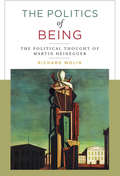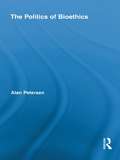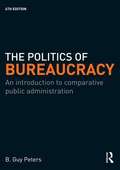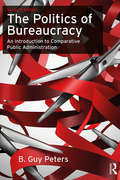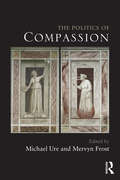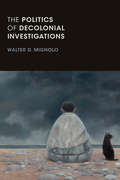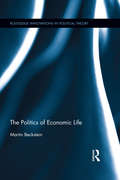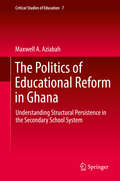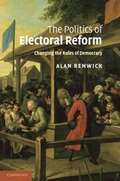- Table View
- List View
The Politics Of Subjectivity In American Foreign Policy Discourses
by Ty SolomonWhy are some discourses more politically efficacious than others? Seeking answers to this question, Ty Solomon develops a new theoretical approach to the study of affect, identity, and discourse--core phenomena whose mutual interweaving have yet to be fully analyzed in International Relations. Drawing upon Jacques Lacan's psychoanalytic theory and Ernesto Laclau's approach to hegemonic politics, Solomon argues that prevailing discourses offer subtle but powerfully appealing opportunities for affective investment on the part of audiences. Through empirical case studies of the affective resonances of the war on terror and the rise and fall of neoconservative influence in American foreign policy, Solomon offers a unique way to think about the politics of identity as the construction of "common sense" powerfully underpinned by affective investments. He provides both a fuller understanding of the emotional appeal of political rhetoric in general and, specifically, a provocative explanation of the reasons for the reception of particular U. S. foreign policy rhetoric that shifted Americans' attitudes toward neoconservative foreign policy in the 1990s and shaped the post-9/11 "war on terror. "
The Politics Presidents Make: Leadership from John Adams to Bill Clinton, Revised Edition
by Stephen SkowronekStephen Skowronek’s wholly innovative study demonstrates that presidents are persistent agents of change, continually disrupting and transforming the political landscape. In an afterword to this new edition, the author examines “third way” leadership as it has been practiced by Bill Clinton and others. These leaders are neither great repudiators nor orthodox innovators. They challenge received political categories, mix seemingly antithetical doctrines, and often take their opponents’ issues as their own.
The Politics and Aesthetics of Hunger and Disgust: Perspectives on the Dark Grotesque (Routledge Interdisciplinary Perspectives on Literature)
by Andrew Norris Michel DelvilleThis study examines how hunger narratives and performances contribute to a reconsideration of neglected or prohibited domains of thinking which only a full confrontation with the body’s heterogeneity and plasticity can reveal. From literary motif or psychosomatic symptom to revolutionary gesture or existential malady, the double crux of hunger and disgust is a powerful force which can define the experience of embodiment. Kafka’s fable of the "Hunger Artist" offers a matrix for the fast, while its surprising last-page revelation introduces disgust as a correlative of abstinence, conscious or otherwise. Grounded in Kristeva’s theory of abjection, the figure of the fraught body lurking at the heart of the negative grotesque gathers precision throughout this study, where it is employed in a widening series of contexts: suicide through overeating, starvation as self-performance or political resistance, the teratological versus the totalitarian, the anorexic harboring of death. In the process, writers and artists as diverse as Herman Melville, Percy Bysshe Shelley, Christina Rossetti, George Orwell, Knut Hamsun, J.M. Coetzee, Cindy Sherman, Pieter Breughel, Marina Abramovic, David Nebreda, Paul McCarthy, and others are brought into the discussion. By looking at the different acts of visceral, affective, and ideological resistance performed by the starving body, this book intensifies the relationship between hunger and disgust studies while offering insight into the modalities of the "dark grotesque" which inform the aesthetics and politics of hunger. It will be of value to anyone interested in the culture, politics, and subjectivity of embodiment, and scholars working within the fields of disgust studies, food studies, literary studies, cultural theory, and media studies.
The Politics and Ethics of Evaluation (Routledge Revivals)
by Clem AdelmanFirst published in 1984, The Politics and Ethics of Evaluation considers, from the vantage point of the authors’ considerable experience of a wide range of evaluation, the ways in which they, and others, have coped with ethical and political problems that inherently arise during the evaluation process, particularly that of the responsive or democratic type. It looks at the evaluator’s claim to independence and how this is qualified by his relationship to his subject and to various other audiences.The ethical and political problems of evaluation are discussed from the different perspectives of moral philosophy, sociology, the politics of organisations, curriculum development, and institutional evaluation. Also included is a chapter detailing English law and legal judgements pertaining to qualified privilege, libel and defamation of character. Guidelines for conducting independent evaluation conclude the volume. This book will be of interest to students and researchers of higher education, curriculum studies and ethics.
The Politics and Ethics of Identity
by Richard Ned LebowWe are multiple, fragmented, and changing selves who, nevertheless, believe we have unique and consistent identities. What accounts for this illusion? Why has the problem of identity become so central in post-war scholarship, fiction, and the media? Following Hegel, Richard Ned Lebow contends that the defining psychological feature of modernity is the tension between our reflexive and social selves. To address this problem Westerners have developed four generic strategies of identity construction that are associated with four distinct political orientations. Lebow develops his arguments through comparative analysis of ancient and modern literary, philosophical, religious, and musical texts. He asks how we might come to terms with the fragmented and illusionary nature of our identities and explores some political and ethical implications of doing so.
The Politics and Ethics of Transhumanism: Techno-Human Evolution and Advanced Capitalism
by Alexander ThomasAvailable open access digitally under CC-BY-NC-ND licenceTranshumanism is a philosophy which advocates for the use of technology to radically enhance human capacities.This book interrogates the promises of transhumanism, arguing that it is deeply entwined with capitalist ideology. In an era of escalating crisis and soaring inequality, it casts doubt on a utopian techno-capitalist narrative of unending progress. In critiquing the transhumanist project, the book offers an alternative ethical framework for the future of life on the planet.As the debates around the advancement of AI and corporate-led digital technologies intensify, this is an important read for academics as well as policy makers .
The Politics and Philosophy of Michael Oakeshott (Routledge Studies in Social and Political Thought)
by Stuart IsaacsMichael Oakeshott was a leading Political theorist described by The Telegraph in 1990 as "the greatest political philosopher in the Anglo-Saxon tradition since Mill – or even Burke". There has been sustained interest in his work, and a developing body of literature, over recent years. This book offers a clearly written and accessible critical analysis: it presents complex theories and concepts in a way that will introduce new readers to Oakeshott’s work, and at the same time offers a fresh approach for those already familiar with his philosophy. The Politics and Philosophy of Michael Oakeshott reveals how his work relates to contemporary political philosophy (for example, Arendt, Rorty, Rawls); and moreover, how it links to broader debates within philosophy and the social sciences and, building upon the work of Devigne, through to postmodernism. This book brings together the disparate influences that have, at various times, been associated with Oakeshott’s work, and draws from a number of essays which have been published posthumously. Referring to these, and other more well-known texts, the author makes sense of the many dimensions of Oakeshott’s work by placing a moral concern as central to his system of thought. All in all this book considers the recently published ‘lesser-known’ essays as well as the latest secondary appraisals of Oakeshott’s work, which sets his thought in the contemporary political environment of the twenty-first century. This much-needed text with be of great interest to students and researchers in political science and philosophy.
The Politics and Poetics of Cinematic Realism (Columbia Themes in Philosophy, Social Criticism, and the Arts)
by Hermann KappelhoffHermann Kappelhoff casts the evolution of cinema as an ongoing struggle to relate audiences to their historical moment. Appreciating cinema's unique ability to bind concrete living conditions to individual experience (which existing political institutions cannot), he reads films by Sergei Eisenstein and Pedro Almodóvar, by the New Objectivity and the New Hollywood, to demonstrate how cinema situates spectators within society. Kappelhoff applies the Deleuzean practice of "thinking in images" to his analysis of films and incorporates the approaches of Jacques Rancière and Richard Rorty, who see politics in the permanent reconfiguration of poetic forms. This enables him to conceptualize film as a medium that continually renews the audiovisual spaces and temporalities through which audiences confront reality. Revitalizing the reading of films by Visconti, Fassbinder, Kubrick, Friedkin, and others, Kappelhoff affirms cinema's historical significance while discovering its engagement with politics as a realm of experience.
The Politics and Poetics of Everyday Life
by Kristin RossUsing the concept of the everyday as a lever for social transformationThe texts in this volume represent Kristin Ross&’s attempt to think the question of the everyday across a range of discourses, practices and knowledges, from philosophy to history, from the visual arts to popular fiction, all the way to the forms taken by collective political action in the territorial struggles of today. If everyday life is, as many have come to believe, the ideal vantage point for an analysis of the social, it is also the crucial first step in its transformation.The volume opens with a return to Henri Lefebvre&’s powerful attempt to use the everyday as both residue and resource, as the site of profound alienation and—by the same token—the site where all emancipatory initiatives and desires begin.The second section focuses on our attempts to represent our lived reality to ourselves in cultural forms, from painting and literature and film to an analysis of the contemporary transformations of the sub-genre most embedded in the deep superficiality of everyday life: detective fiction.The final section turns to present-day ecological occupations in the wake of the zad at Notre-Dame-des-Landes, and locates the everyday as a site for rich oppositional resources and immanent social creativity.
The Politics of Agency: Toward a Pragmatic Approach to Philosophical Anthropology (Ashgate New Critical Thinking in Philosophy)
by J. Jeremy WisnewskiDebates about individualism and holism, reductionism and phenomenology, and naturalism and humanism all turn on how we answer the basic questions about the nature of human agency. This book argues that the traditional emphasis on the accuracy of a given theory of human agency has systematically obscured the normative dimension in these theories and that recognizing this normative dimension allows us to see that a pragmatic approach to theories of agency, either in social science or moral philosophy, is more appropriate. As well as offering a vigorous presentation of the pragmatic-therapeutic account of agency Wisnewski also engages critically with three rival accounts from Nietzsche, Foucault and Rorty.
The Politics of American Foreign Policy: How Ideology Divides Liberals and Conservatives over Foreign Affairs
by Peter Hays GriesIn this provocative book, Peter Gries directly challenges the widely held view that partisan elites on Capitol Hill are out of touch with a moderate American public. Dissecting a new national survey, Gries shows how ideology powerfully divides Main Street over both domestic and foreign policy and reveals how and why, with the exception of attitudes toward Israel, liberals consistently feel warmer toward foreign countries and international organizations, and desire friendlier policies toward them, than conservatives do. And because most Congressional districts have become hyper-partisan, many politicians today cater not to the "median voter" in their districts, but to the primary voters who elect them. The perverse incentives of the U.S. electoral system, therefore, are empowering the ideological extremes, contributing to elite partisanship over American foreign policy. The Politics of American Foreign Policy weaves seamlessly together in-depth examinations of the psychological roots and foreign policy consequences of the liberal-conservative divide, the cultural, socio-racial, economic, and political dimensions of American ideology, and the moral values and foreign policy orientations that divide Democrats and Republicans. Within this context, the book explores in detail why American liberals and conservatives disagree over US policy relating to Latin America, Europe, the Middle East, East Asia, and international organizations such as the UN.
The Politics of Annihilation: A Genealogy of Genocide
by Benjamin MeichesHow did a powerful concept in international justice evolve into an inequitable response to mass suffering?For a term coined just seventy-five years ago, genocide has become a remarkably potent idea. But has it transformed from a truly novel vision for international justice into a conservative, even inaccessible term? The Politics of Annihilation traces how the concept of genocide came to acquire such significance on the global political stage. In doing so, it reveals how the concept has been politically contested and refashioned over time. It explores how these shifts implicitly impact what forms of mass violence are considered genocide and what forms are not. Benjamin Meiches argues that the limited conception of genocide, often rigidly understood as mass killing rooted in ethno-religious identity, has created legal and political institutions that do not adequately respond to the diversity of mass violence. In his insistence on the concept&’s complexity, he does not undermine the need for clear condemnations of such violence. But neither does he allow genocide to become a static or timeless notion. Meiches argues that the discourse on genocide has implicitly excluded many forms of violence from popular attention including cases ranging from contemporary Botswana and the Democratic Republic of Congo, to the legacies of colonial politics in Haiti, Canada, and elsewhere, to the effects of climate change on small island nations. By mapping the multiplicity of forces that entangle the concept in larger assemblages of power, The Politics of Annihilation gives us a new understanding of how the language of genocide impacts contemporary political life, especially as a means of protesting the social conditions that produce mass violence.
The Politics of Aristotle
by Aristotle Peter L. Phillips SimpsonA touchstone in Western debates about society and government, the Politics is Aristotle's classic work on the nature of political community. Here, he discusses the merits and defects of various regimes or ways of organizing political community - democracy in particular - and in the process examines such subjects as slavery, economics, the family, citizenship, justice, and revolution.
The Politics of Autonomy in Latin America
by Ana Cecilia DinersteinThe author contests older concepts of autonomy as either revolutionary or ineffective vis-à-vis the state. Looking at four prominent Latin American movements, she defines autonomy as 'the art of organising hope': a tool for indigenous and non-indigenous movements to prefigure alternative realities at a time when utopia can be no longer objected.
The Politics of Being: The Political Thought of Martin Heidegger
by Richard WolinMartin Heidegger's ties to Nazism have tarnished his stature as one of the towering figures of twentieth-century philosophy. The publication of the Black Notebooks in 2014, which revealed the full extent of Heidegger's anti-Semitism and enduring sympathy for National Socialism, only inflamed the controversy. Richard Wolin's The Politics of Being: The Political Thought of Martin Heidegger has played a seminal role in the international debate over the consequences of Heidegger's Nazism. In this edition, the author provides a new preface addressing the effect of the Black Notebooks on our understanding of the relationship between politics and philosophy in Heidegger's work. Building on his pathbreaking interpretation of the philosopher's political thought, Wolin demonstrates that philosophy and politics cannot be disentangled in Heidegger's oeuvre. Völkisch ideological themes suffuse even his most sublime philosophical treatises. Therefore, despite Heidegger's profundity as a thinker, his critique of civilization is saturated with disturbing anti-democratic and anti-Semitic leitmotifs and claims.
The Politics of Bioethics (Routledge Studies in Science, Technology and Society)
by Alan PetersenRecent rapid advances in the biosciences have led to considerable debate about the social, ethical, and legal implications of research and its applications. The mapping of the human genome, advances in cloning techniques, the harvesting of embryonic stem cells for research, increasing use of genetic testing in healthcare, and the development of large-scale genetic databases have not only generated high expectations about new diagnostics and treatments but also considerable widespread fear about their consequences. This book offers a critical appraisal of bioethics and its implications as it pertains to the fields of health and medicine and public health, with a particular emphasis on recent technological innovations as they provide a noteworthy exemplar of the power of bioethics in shaping policies, practices and notions of societal benefits. Whereas other books have tended to examine ethical dilemmas and challenges of applying ethical principles, often in relation to a limited array of issues, this book investigates the socio-political implications of bioethics discourse and practices in relation to a range of controversial (or potentially controversial) developments. Providing a benchmark for future debate and scholarly work, this volume will be of interest to policymakers, clinicians, scholars, and others who are looking for new ways of making sense and evaluating recent developments in the field of bioethics.
The Politics of Bureaucracy: An Introduction to Comparative Public Administration
by B. Guy PetersWritten by a leading authority in the field, this comprehensive exploration of the political and policy-making roles of public bureaucracies is now available in a fully revised sixth edition, offering extensive, well documented comparative analysis of the effects of politics on bureaucracy. New to the 6th edition: More international case studies on North America, Western and Eastern European and Asian countries. Discussion of how governments have been developing strategies to enhance co-ordination and coherence across their programmes. Analysis of the use of performance management in public administration. More tables, case studies and internet links. Extensive revision and updating to take into account the wealth of new literature that has emerged in recent years, including a discussion of E-Governance and analysis of 'new public management'. Drawing on evidence from a wide variety of political systems, The Politics of Bureaucracy continues to be essential reading for all students of government, policy analysis, and politics and international relations.
The Politics of Bureaucracy: An Introduction to Comparative Public Administration
by B. Guy PetersWritten by B. Guy Peters, a leading authority in the field, this comprehensive exploration of the political and policy making roles of public bureaucracies is now available in a fully revised seventh edition, offering extensive, well-documented comparative analysis of the effects of politics on bureaucracy. Updates to this edition include: All new coverage of public administration in Latin America and Africa, with special attention paid to the impact of New Public Management and other ideas for reform; An examination of the European Union and its effects on public policy and public administration in member countries, as well as an exploration of the EU as a particular type of bureaucracy; A renewed emphasis on coordination and the role of central agencies; A thorough assessment of 'internationalization' of bureaucracies and concerns with the role of international pressures on domestic governments and organizations in the public sector; Coverage of the wide-ranging impacts of the 2008 economic slowdown on public bureaucracies and public policies, and the varied success of governmental responses to the crisis. Drawing on evidence from a wide variety of political systems, The Politics of Bureaucracy, Seventh Edition, continues to be essential reading for all students of government, policy analysis, politics, and international relations.
The Politics of Compassion
by Mervyn Frost Michael UreThis book provides a critical overview of the role of the emotions in politics. Compassion is a politically charged virtue, and yet we know surprisingly little about the uses (and abuses) of compassion in political environments. Covering sociology, political theory and psychology, and with contributions from Martha Nussbaum and Andrew Linklater amongst others, the book gives a succinct overview of the main theories of political compassion and the emotions in politics. It covers key concepts such as humanitarianism, political emotion and agency in relation to compassion as a political virtue. The Politics of Compassion is a fascinating resource for students and scholars of political theory, international relations, political sociology and psychology.
The Politics of Corruption in Dictatorships
by Vineeta Yadav Bumba Mukherjee Yadav, Vineeta and Mukherjee, BumbaThe Politics of Corruption in Dictatorships studies how institutional and social factors influence corruption in dictatorships. Dictatorships are often synonymous with high levels of corruption, yet Vineeta Yadav and Bumba Mukherjee argue otherwise. The authors ask why corruption has declined in some but not other authoritarian regimes. What are the main political factors that drive some autocrats to curb corruption? The book explores the role that business mobilization can play in reducing corruption under some conditions in dictatorships. It investigates how political competition for an elected legislature affects the incentives of dictators to engage in corruption. The study relies on case studies from Jordan, Malaysia, and Uganda. The book is accessible to a wide audience without requiring sophisticated statistical training.
The Politics of Decolonial Investigations (On Decoloniality)
by Walter D. MignoloIn The Politics of Decolonial Investigations Walter D. Mignolo provides a sweeping examination of how coloniality has operated around the world in its myriad forms from the sixteenth century to the twenty-first. Decolonial border thinking allows Mignolo to outline how the combination of the self-fashioned narratives of Western civilization and the hegemony of Eurocentric thought served to eradicate all knowledges in non-European languages and praxes of living and being. Mignolo also traces the geopolitical origins of racialized and gendered classifications, modernity, globalization, and cosmopolitanism, placing them all within the framework of coloniality. Drawing on the work of theorists and decolonial practitioners from the Global South and the Global East, Mignolo shows how coloniality has provoked the emergence of decolonial politics initiated by delinking from all forms of Western knowledge and subjectivities. The urgent task, Mignolo stresses, is the epistemic reconstitution of categories of thought and praxes of living destituted in the very process of building Western civilization and the idea of modernity. The overcoming of the long-lasting hegemony of the West and its distorted legacies is already underway in all areas of human existence. Mignolo underscores the relevance of the politics of decolonial investigations, in and outside the academy, to liberate ourselves from canonized knowledge, ways of knowing, and praxes of living.
The Politics of Economic Life (Routledge Innovations in Political Theory)
by Martin BecksteinIn recent years, economic life has become increasingly politicized: now, every company has a ‘philosophy’, promising its customers some ethical surplus in return for buying their products; consumers shop for change; workers engage in individualized forms of employee activism such as whistleblowing; and governments contribute to the re-configuration of the economic sphere as a site of political contestation by reminding corporate and private economic actors of their duty to ‘do their bit’. The Politics of Economic Life addresses this trend by exploring the ways in which practices of consumption, work, production, and entrepreneurship are imbued with political strategy and ideology, and assesses the potentials and perils of the politicization of economic activity for democracy in the 21st century.
The Politics of Educational Reform in Ghana: Understanding Structural Persistence in the Secondary School System (Critical Studies of Education #7)
by Maxwell A. AziabahThis book comprises six main chapters and addresses the core research question: How can the endurance of academic bias in Ghana’s secondary education system be explained in the context of educational reform versus change of government concurrence? Six sub-questions have subsequently been derived from the core research question, enabling a comprehensive and rigorous treatment of the subject matter of investigation. The manuscript adopts an historical institutionalism approach, combining path dependency with partisan theory in explicating structural persistence in the secondary school system in Ghana. A case study methodological design procedure has been employed in the investigation of three episodes of educational reform, anchored on qualitative content analysis as the main data reduction mechanism.
The Politics of Electoral Reform
by Alan RenwickElections lie at the heart of democracy, and this book seeks to understand how the rules governing those elections are chosen. Drawing on both broad comparisons and detailed case studies, it focuses upon the electoral rules that govern what sorts of preferences voters can express and how votes translate into seats in a legislature. Through detailed examination of electoral reform politics in four countries (France, Italy, Japan and New Zealand), Alan Renwick shows how major electoral system changes in established democracies occur through two contrasting types of reform process. Renwick rejects the simple view that electoral systems always straightforwardly reflect the interests of the politicians in power. Politicians' interests are complex; politicians are sometimes unable to pursue reforms they want; occasionally, they are forced to accept reforms they oppose. The Politics of Electoral Reform shows how voters and reform activists can have real power over electoral reform.
The Politics of Eloquence
by Marc HanveltHistory has shown us that the power of political speech can be put to both positive and manipulative ends - while rhetoric is a powerful tool for those who seek to persuade others to adopt their views, it can also be employed to foment factionalism and undermine the very basis of a democratic society. In this unique study, Marc Hanvelt shows how eighteenth-century philosopher David Hume confronted questions about the negative moral and political effects of rhetoric, and how he differentiated between manipulative and non-manipulative political speech.Drawing on Hume's philosophical, historical, and popular writings, The Politics of Eloquence presents an understanding of rhetoric that can be properly ascribed to this important thinker, an understanding hitherto overlooked in the scholarly literature. Offering an original approach to thinking about political rhetoric - an essential element of democratic politics - Hanvelt makes important contributions to both Hume scholarship and to broader areas in political theory and philosophy.
